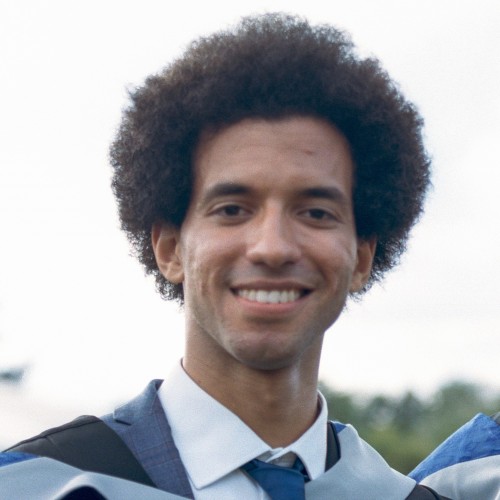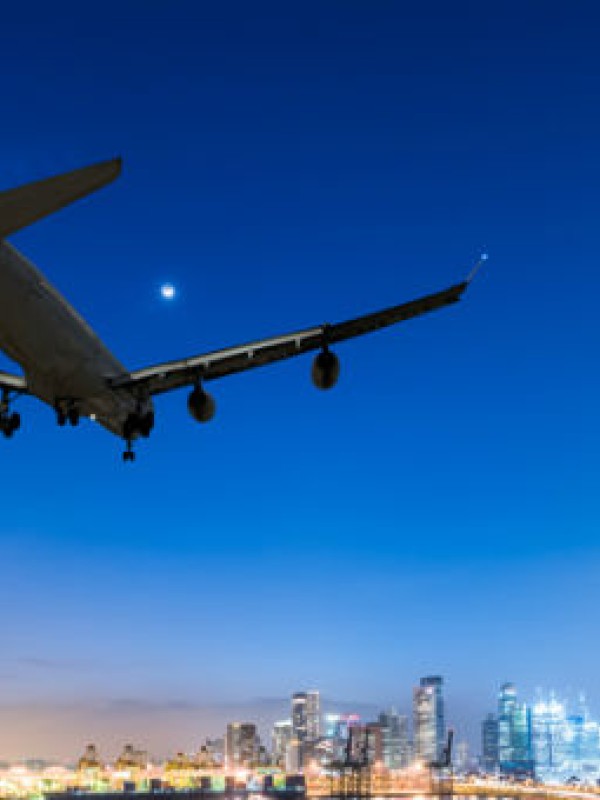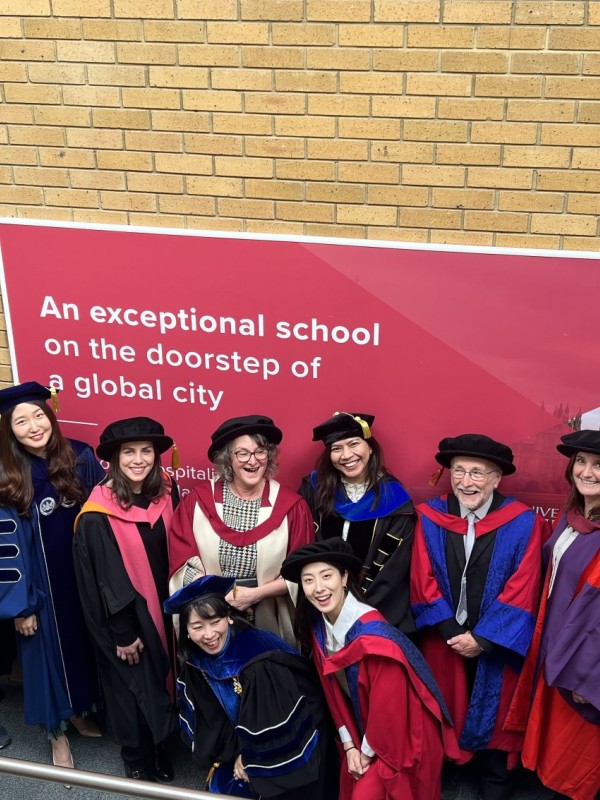
- Air Transport Management
MSc — 2025 entry Air Transport Management
At a time of rapid advances in air transport technologies and a drive towards sustainable aviation, now is an exciting time to join the air transport management sector. This programme will equip you with the skills and knowledge required by the future managers and leaders of the industry.
Why choose
this course?
- This programme will provide you with the specialist knowledge, expertise and skills required to succeed in the rapidly evolving business of air transport.
- You’ll benefit from our pioneering research and industry analysis, as well as our unique proximity to Heathrow and Gatwick airports, that serve over 120 global airlines.
- Our outstanding links with the air transport industry mean that senior industry executives who are at CEO or vice president level regularly give guest lectures to our students - you can use our networks to develop your own professional contacts.
- This is the only air transport management course in the UK that will allow you the opportunity of using all three commercial software packages used by industry analysts and consultants as well as airlines and airports: OAG, IATA AirportIS and Cirium (Flightglobal). These tools are essential for analysing airline market data and will give you a competitive edge with employers.
- Our part-time programme can be accommodated to suit aircrew rosters (schedules), making it ideal for airline and airport professionals seeking to upgrade their skills in the commercial aspects of the industry.
Statistics
1st in the UK
Surrey Hospitality and Tourism Management is ranked 1st in the UK and 15th in the world in the QS World University Rankings by Subject 2024
Fantastic graduate prospects
94% of Surrey Hospitality and Tourism Management postgraduate students go on to employment or further study (Graduate Outcomes 2024, HESA)
2nd in the UK
Surrey Hospitality and Tourism Management is ranked 2nd in the UK for tourism, transport and travel in the 2023 Postgraduate Taught Experience Surrey (PTES) with an overall satisfaction score of 98% (CAH3)


Quote
“ The MSc Air Transport Management at the University of Surrey stood out for its stellar reputation and dynamic learning experience. ”
What you will study
Our MSc in Air Transport Management is well-designed and intellectually challenging to equip you with the skills and the knowledge required for employment.
Throughout your studies, you’ll learn about the fundamental aspects of air transport management, as well as analyse and debate theoretical and applied knowledge. You’ll also learn about the operation and organisation of airlines and airports and the latest technology.
This is the only air transport management course in the UK that will allow you the opportunity of using all three commercial software packages used by industry analysts and consultants as well as airlines and airports today: OAG, IATA AirportIS and Cirium (Flightglobal). These tools are essential for analysing airline market data and will give you a competitive edge with employers.
You’ll produce a dissertation that researches a specialist topic, chosen by yourself, which will lead to an in-depth knowledge of this subject.
In a rapidly evolving sector, we are committed to maintaining the relevance of the content. Our modules, reflecting current industry needs and research focus, may adapt in response to emerging themes and external shifts. This adaptability allows us to improve the learning experience, and align with feedback from students and with guidelines from external industry consultation groups.
Professional recognition
MSc - Royal Aeronautical Society
This programme is approved and recognised by the Royal Aeronautical Society
Visiting speakers
High-level industry guest speakers at CEO and vice president-level regularly visit students on this programme to share real-life experiences of the sector and insight on industry trends. Examples include speakers from EasyJet, American Airlines and the European Commission. We foster this type of commercial acumen embedded within a framework of academic excellence to give you the best knowledge and expertise. Find out more about our visiting speakers in the Surrey Hospitality and Tourism Management.
Industry partnerships
We are deeply committed to providing our students with an immersive learning experience. Our strategic partnerships with the UK Civil Aviation Regulator's technical arm, UK CAAi, and the Royal Aeronautical Society (RAeS) ensure our modules are rooted in real-world applications, allowing for a hands-on learning experience. These collaborations open up avenues for students to network with key industry figures, fostering lifelong professional connections that can lead to exciting opportunities such as internships and potential future employment.
Moreover, our strong affiliations with regulatory bodies allow us to maintain a curriculum that is current, relevant, and in line with the latest industry standards. This ensures you're always at the forefront of your field. We also facilitate your active participation in ongoing industry events, keeping you informed about the latest trends and challenges, and helping you embarking on a journey towards a successful career in the aviation sector.
Research-led and practice-based education
Every aspect of this course – from the learning and teaching to the assessment – is designed with the sole focus of preparing you for your professional life after Surrey. A key way in which we do this is through authentic assessments. For example, in the Aviation Finance module, students are asked to critically evaluate the last five years of financial statements of an airline, and to develop a technical report discussing the financial results and providing recommendations of the airline’s financial strengths and weaknesses and a one-year outlook.
Our MSc in Air Transport Management, running from October to April, offers a flexible, yet comprehensive study experience, making it ideal for part-time students and working professionals. This programme involves nine core modules, enriched by case studies and industry-focused seminars.
The programme offers two tracks: full-time and part-time. For professionals who are in full-time employment looking to progress their careers with academic study alongside their operational roles, our part-time track is ideal.
Each module is taught in intensive one-week blocks where you have full days of studying, which includes lectures, seminars, workshops, group work, and industry guest lectures. This facilitates learning for students who have commitments outside university and prefer flexible study schedules. There is normally a two-week time gap between the modules when you are expected to conduct independent study for your upcoming assignment. Your prior knowledge and experiences are accommodated throughout the programme so the learning can be applied, and your experiences relevant.
The structure of our programmes follows clear educational aims that are tailored to each programme. These are all outlined in the programme specifications which include further details such as the learning outcomes:
Modules
Modules listed are indicative, reflecting the information available at the time of publication. Modules are subject to teaching availability, student demand and/or class size caps.
The University operates a credit framework for all taught programmes based on a 15-credit tariff, meaning all modules are comprised of multiples of 15 credits, up to a maximum of 120 credits.
Course options
Year 1
Semester 1
Compulsory
The Research Methods module aims to help students to develop an understanding of the research process and to undertake research leading to successful completion of their dissertation. It enables students to conduct research independently and also provides them with the knowledge, skills and understanding required to develop their proposal for their dissertation. The module covers ideas, techniques, and methods relevant to different stages of the research process, stressing the interdependence of each stage in conducting effective, coherent and rigorous research. By covering the fundamentals of research methods and research methodologies, this module will enable students to conduct research independently and provide them with the knowledge and understanding needed to do a dissertation.
View full module detailsThis module introduces key issues in air transport management and provide students with fundamental skills in airline/airport operations and management.
View full module detailsThis module provides students with knowledge and skills in conducting air transport market analysis and performing traffic forecasts.
View full module detailsTo provide students with the fundamental skills of the aircraft selection and fleet planning process.
View full module detailsSemester 2
Compulsory
Provide students with an understanding of how financial concepts are integrated and applied to decision making in the air transport industry.
View full module detailsThis module aims to develop students' ability to evaluate principles of sustainability as applied to the aviation sector. In this module, students will explore the relationship between aviation and emergent social and environmental issues. Environmental implications for the aviation sector are dissected into three key areas: governance, technological advancements and consumer perspectives. Socio-cultural issues ranging from diversity to hypermobility will also be examined. This module is relevant to individuals interested in working within the aviation sector, as well as those working alongside aviation industry bodies. The module will provide students with a holistic perspective of aviation and sustainability, and equip students with the skills to critically evaluate future pathways for the aviation sector.
View full module detailsThis module provides an overview of the important functions of airport management for the seamless operation. Airports have a vital role in processing both passengers and cargo, however they are complex businesses and have a range of qualities. From being landlords, to providing infrastructure for airlines, retailers and other airport users, airports differ in size, type (local, regional, international, global hubs), ownership and governance structure.
View full module detailsThis module is designed to provide a solid comprehension of how marketing concepts can be applied to the aviation industry. It delivers an insightful and thorough understanding of the marketing mix through an aviation lens. This module encapsulates the core competencies and innovative strategies of aviation marketing. It also explores the best marketing strategies currently being employed in a hyper-competitive aviation market. The course will be of particular value to students to apply creative and innovative marketing ideas to the aviation industry. The following teaching methods are applied in this module: pre-readings, lectures, industry guest speakers, class exercises and discussions, real world cases.
View full module detailsThis module provides a comprehensive overview of the global airline industry from a strategic management perspective. It captures a broad spectrum of various business strategies deployed by Airlines in Asia, Europe, Gulf and the Americas
View full module detailsSemester 1 & 2
Compulsory
The dissertation is compulsory for MSc Air Transport Management Programme and is the final element of the programme, providing an opportunity for a sustained period of independent study and research. It allows students to concentrate on topics that are of particular interest to them and it draws upon a range of different aspects of the taught programme particularly the Research Methods module (MANM347). Students can build upon their knowledge and topics learnt from programme-specific modules studies in semester 1 to develop and define their research idea and questions. It also gives an opportunity for students to work independently with an individual supervisor. The dissertation is an academic thesis. This form of dissertation follows the standard academic pattern of identifying a topic arising from a gap in the literature and developing a methodology to explore this area in-depth.
View full module detailsYear 1
Semester 1
Compulsory
This module introduces key issues in air transport management and provide students with fundamental skills in airline/airport operations and management.
View full module detailsTo provide students with the fundamental skills of the aircraft selection and fleet planning process.
View full module detailsSemester 2
Compulsory
Provide students with an understanding of how financial concepts are integrated and applied to decision making in the air transport industry.
View full module detailsThis module provides a comprehensive overview of the global airline industry from a strategic management perspective. It captures a broad spectrum of various business strategies deployed by Airlines in Asia, Europe, Gulf and the Americas
View full module detailsYear 2
Semester 1
Compulsory
The Research Methods module aims to help students to develop an understanding of the research process and to undertake research leading to successful completion of their dissertation. It enables students to conduct research independently and also provides them with the knowledge, skills and understanding required to develop their proposal for their dissertation. The module covers ideas, techniques, and methods relevant to different stages of the research process, stressing the interdependence of each stage in conducting effective, coherent and rigorous research. By covering the fundamentals of research methods and research methodologies, this module will enable students to conduct research independently and provide them with the knowledge and understanding needed to do a dissertation.
View full module detailsThis module provides students with knowledge and skills in conducting air transport market analysis and performing traffic forecasts.
View full module detailsSemester 2
Compulsory
This module aims to develop students' ability to evaluate principles of sustainability as applied to the aviation sector. In this module, students will explore the relationship between aviation and emergent social and environmental issues. Environmental implications for the aviation sector are dissected into three key areas: governance, technological advancements and consumer perspectives. Socio-cultural issues ranging from diversity to hypermobility will also be examined. This module is relevant to individuals interested in working within the aviation sector, as well as those working alongside aviation industry bodies. The module will provide students with a holistic perspective of aviation and sustainability, and equip students with the skills to critically evaluate future pathways for the aviation sector.
View full module detailsThis module provides an overview of the important functions of airport management for the seamless operation. Airports have a vital role in processing both passengers and cargo, however they are complex businesses and have a range of qualities. From being landlords, to providing infrastructure for airlines, retailers and other airport users, airports differ in size, type (local, regional, international, global hubs), ownership and governance structure.
View full module detailsThis module is designed to provide a solid comprehension of how marketing concepts can be applied to the aviation industry. It delivers an insightful and thorough understanding of the marketing mix through an aviation lens. This module encapsulates the core competencies and innovative strategies of aviation marketing. It also explores the best marketing strategies currently being employed in a hyper-competitive aviation market. The course will be of particular value to students to apply creative and innovative marketing ideas to the aviation industry. The following teaching methods are applied in this module: pre-readings, lectures, industry guest speakers, class exercises and discussions, real world cases.
View full module detailsSemester 1 & 2
Compulsory
The dissertation is compulsory for MSc Air Transport Management Programme and is the final element of the programme, providing an opportunity for a sustained period of independent study and research. It allows students to concentrate on topics that are of particular interest to them and it draws upon a range of different aspects of the taught programme particularly the Research Methods module (MANM347). Students can build upon their knowledge and topics learnt from programme-specific modules studies in semester 1 to develop and define their research idea and questions. It also gives an opportunity for students to work independently with an individual supervisor. The dissertation is an academic thesis. This form of dissertation follows the standard academic pattern of identifying a topic arising from a gap in the literature and developing a methodology to explore this area in-depth.
View full module detailsGeneral course information
Contact hours
Contact hours can vary across our modules. Full details of the contact hours for each module are available from the University of Surrey's module catalogue. See the modules section for more information.
Timetable
Course timetables are normally available one month before the start of the semester.
New students will receive their personalised timetable in Welcome Week, and in subsequent semesters, two weeks prior to the start of semester.
Please note that while we make every effort to ensure that timetables are as student-friendly as possible, scheduled teaching can take place on any day of the week (Monday – Friday). Wednesday afternoons are normally reserved for sports and cultural activities. Part-time classes are normally scheduled on one or two days per week, details of which can be obtained from Academic Administration.
Location
This course is based at Stag Hill campus. Stag Hill is the University's main campus and where the majority of our courses are taught.
We offer careers information, advice and guidance to all students whilst studying with us, which is extended to our alumni for three years after leaving the University.
This pioneering course will give you a distinct competitive advantage in today’s international job market. The programme is taught by extremely well-regarded academics who continuously publish in respected journals and whose research sets industry standards.
Our Air Transport Management MSc graduates have gone on to develop promising careers in the following roles/areas:
- Airline management
- Airport management
- Aircraft manufacturer
- Aircraft leasing
- Aircraft maintenance
- Consultancy
- Air cargo and logistics
- Ground handling
- Airline catering
- Aviation journalism.
Find out where some of our recent graduates are now working.


Ananda Suci Munggaran
Student - Air Transport Management MSc
This course uncovers and explores the amazing hidden truths that exist inside the aviation business.


Amr Soliman
Student - Air Transport Management MSc
"When you choose a masters course that you enjoy, at an institution that delivers it at an amazing quality, you naturally become motivated, driven and excited to learn."
UK qualifications
A minimum of a 2:2 UK honours degree, or a recognised equivalent international qualification.
Applicants who do not meet these requirements but hold an air transport pilot license or air traffic controller license, plus a minimum of three years relevant work experience, can also be considered on a case by case basis (subject to interview).
English language requirements
IELTS Academic: 6.5 overall including 6.0 in each category.
These are the English language qualifications and levels that we can accept.
If you do not currently meet the level required for your programme, we offer intensive pre-sessional English language courses, designed to take you to the level of English ability and skill required for your studies here.
Recognition of prior learning
We recognise that many students enter their course with valuable knowledge and skills developed through a range of ways.
If this applies to you, the recognition of prior learning process may mean you can join a course without the formal entry requirements, or at a point appropriate to your previous learning and experience.
There are restrictions for some courses and fees may be payable for certain claims. Please contact the Admissions team with any queries.
Scholarships and bursaries
Discover what scholarships and bursaries are available to support your studies.
Fees per year
Explore UKCISA’s website for more information if you are unsure whether you are a UK or overseas student. View the list of fees for all postgraduate courses.
September 2025 - Full-time - 1 year
- UK
- £12,400
- Overseas
- £19,900
September 2025 - Part-time - 2 years
- UK
- £6,200
- Overseas
- £10,000
- If you are on the two-year part-time masters programme, the annual fee is payable in Year 1 and Year 2 of the programme
- These fees apply to students commencing study in the academic year 2025-26 only. Fees for new starters are reviewed annually.
Payment schedule
- Students with Tuition Fee Loan: the Student Loans Company pay fees in line with their schedule (students on an unstructured self-paced part-time course are not eligible for a Tuition Fee Loan).
- Students without a Tuition Fee Loan: pay their fees either in full at the beginning of the programme or in two instalments as follows:
- 50% payable 10 days after the invoice date (expected to be October/November of each academic year)
- 50% in January of the same academic year.
- Students on part-time programmes where fees are paid on a modular basis: cannot pay fees by instalment.
- Sponsored students: must provide us with valid sponsorship information that covers the period of study.
The exact date(s) will be on invoices.
Additional costs
Commuting (local travel expenses): £100 - commuting to airport site visits.
Funding
You may be able to borrow money to help pay your tuition fees and support you with your living costs. Find out more about postgraduate student finance.
Apply online
To apply online first select the course you'd like to apply for then log in.
Select your course
Choose the course option you wish to apply for.
Sign in
Create an account and sign into our application portal.
Please note that we may have to close applications before the stated deadline if we receive a high volume of suitable applications. We advise you to submit your application as soon as it is ready.
ApplyPlease note that we may have to close applications before the stated deadline if we receive a high volume of suitable applications. We advise you to submit your application as soon as it is ready.
ApplyAdmissions information
Once you apply, you can expect to hear back from us within 14 days. This might be with a decision on your application or with a request for further information.
Our code of practice for postgraduate admissions policy explains how the Admissions team considers applications and admits students. Read our postgraduate applicant guidance for more information on applying.
About the University of Surrey
Need more information?
Contact our Admissions team or talk to a current University of Surrey student online.
Terms and conditions
When you accept an offer to study at the University of Surrey, you are agreeing to follow our policies and procedures, student regulations, and terms and conditions.
We provide these terms and conditions in two stages:
- First when we make an offer.
- Second when students accept their offer and register to study with us (registration terms and conditions will vary depending on your course and academic year).
View our generic registration terms and conditions (PDF) for the 2024/25 academic year, as a guide on what to expect.
Disclaimer
This online prospectus has been published in advance of the academic year to which it applies.
Whilst we have done everything possible to ensure this information is accurate, some changes may happen between publishing and the start of the course.
It is important to check this website for any updates before you apply for a course with us. Read our full disclaimer.









